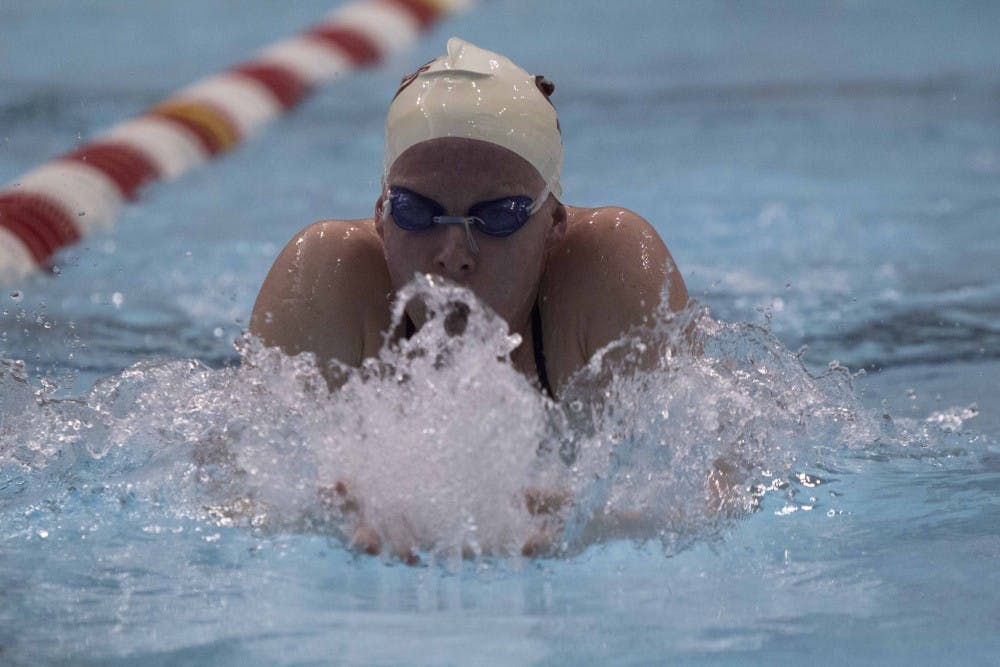A simple wag of a finger took IU’s rising sophomore swimmer Lilly King from an up-and-coming member of Team USA to the instigator in what some are comparing to a Cold War-era tiff.
Her post-semifinals interview with NBC’s Michele Tafoya set Twitter ablaze with backing from fellow Hoosiers, athletes and even celebrities, who all supported her stance on athletes who’ve been caught doping.
King’s words placed her in an international spotlight on the international stage that is the Olympic Games. Last night she defended her statements and won gold. It might not be a stretch to say she’s a household name now — at least for the coming months.
Now is the time for Subway and Proctor & Gamble and Coca-Cola and McDonald’s to jump on the chance to endorse her (not to mention Adidas, Nike, TYR and every other athletic company).
But they can’t.
Per NCAA regulations, in order for King to accept endorsements of these kinds, she’d have to forfeit her amateurism, no longer be eligible to compete as a swimmer for IU and enter a professional status. Now, I understand the need for separation of pros and student athletes, but it’s time the NCAA tweak this rule.
As someone who chose academics over the sport she loved and could have played collegiately, I understand the distinction and importance of student athlete being worded as a “student” first. I understand and back the NCAA’s reasoning for it.
There still needs to be a difference between professional and student. But “amateur” needs some tweaking to cover the middle ground.
Would it be fair to have Thomas Bryant or Mitchell Paige play or practice with the pros on off-days? No, of course not. But if Subway wants one of them to say Subway is their favorite restaurant, is that so wrong?
One of the many reasons for a college athlete to be an Olympian is for the exposure — exposure to elite coaches and athletes, and exposure to a wider audience to inspire the next generation.
Just because King or Bryant or Paige are still competing in college doesn’t mean they shouldn’t be able to accept endorsements from a company that’s willing to give them the money to get through college.
Let’s be honest — the colleges of these athletes love the exposure they’re getting out of it, too. And the NCAA is consistently tweeting about Olympians who are current or former student athletes.
Sure, you could have an Allyson Felix situation where she reportedly paid for college with money made as a professional rather than running track for the University of Southern California. USC can still claim her as their own, but USC’s track program can’t.
Though it might help for overall campus recruiting to say important people went to a university, if they didn’t compete for the school, the athletic department can’t boast about them. And if students can’t be used to their full advertising potential, why bother?
Let’s not forget the whole “student athlete” terminology.
The best way to find a balance of athletics, finances and education would be to allow ad deals and endorsements for NCAA athletes.
You want to be an elite athlete, support yourself or your family and have a college degree? Play your sport for your university. Don’t have time between practices or after practice for a job to make up the difference between your scholarship and your actual cost of living? Here’s a corporate company who can help.
Get a degree without going into debt. Play the game you love. It’s a win-win.
So if an Olympic gold medalist and self-proclaimed “McDonald’s enthusiast” like Lilly King needed to make up the gap and wanted to get an ad deal with McDonald’s to avoid a possible dent in her bank account, she should be able to without losing college eligibility.






